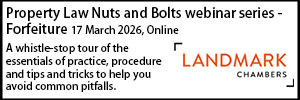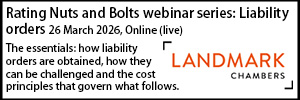The risks in the written representations procedure
- Details
The High Court has overturned an inspector’s decision to uphold an enforcement notice in respect of a property in south-west London. Sam Fowles explains why.
The property had been converted into two separate flats and the matter turned on whether that development had become lawful by passage of time.
The local planning authority (LPA) issued the enforcement notice on the basis that the use of the property as two separate dwellings was without permission. Appellant appealed to the Secretary of State, inter alia, on Ground D – arguing that the use had persisted beyond the statutory 4-year period in which the LPA is entitled to take enforcement action. In support of their case, the Appellant provided records from a tenancy deposit service, which they claimed showed deposits being held in respect of two separate dwellings at the property.
The appeal was determined by written representations. The inspector concluded that the tenancy deposit records did not specify the dwelling to which they related and so did not assist the Apl’s case. This, inter alia, supported the inspector’s decision to refuse the appeal.
The Appellant sought statutory review on the basis that, on the face of the document, the tenancy deposit records did, in fact, specify that the deposit related to either the “top floor” or “ground floor”. The inspector’s decision was, therefore, tainted by either a failure to take a material consideration into account or by an error of fact. On receiving the Appellant’s application for review, the Secretary of State agreed and consented to the High Court overturning the inspector’s decision.
This case highlights some of the risks inherent in the written representations procedure. While the procedure is popular with both the Planning Inspectorate and many parties to appeals because it saves costs, it lacks the level of forensic consideration possible at a Hearing or Inquiry. The inspector does not benefit from the submissions and analysis of counsel nor the opportunity to ask oral questions and seek clarification, this increases the risk of errors of fact or a failure to take material considerations into account. Whether appealing against a planning decision or defending such an appeal, it is important to consider this when making submissions on the preferable form of the determination for the appeal.
Sam Fowles is a barrister at Cornerstone Barristers. Instructed by the Cee Cee Partnership, he acted for the Appellant in this case.
Sponsored articles
Unlocking legal talent
Walker Morris supports Tower Hamlets Council in first known Remediation Contribution Order application issued by local authority
Legal Officer
Senior Solicitor - Property
Legal Director - Government and Public Sector
Locums
Poll














































